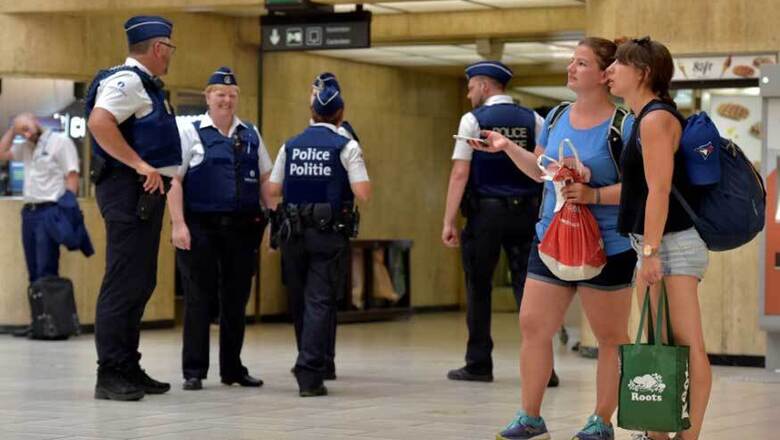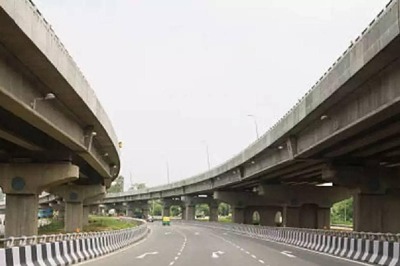
views
Bruxelles: Belgian investigators found evidence on Wednesday that a suspect who set off a bomb at a Brussels train station in the latest in a wave of attacks on Europe had sympathies with the Islamic State group.
Police found explosive materials in a raid on the home of the suspect in Molenbeek, a Brussels district which has been linked to recent deadly terror plots in France and Belgium.
Belgian authorities identified the man, who was shot dead by a soldier, as a 36-year-old Moroccan national with the initials O.Z., while local media named him as Oussama Zariouh.
Prosecutors said police have taken into custody four people who were in "regular contact" with the suspect.
No one was injured in Tuesday's foiled attack at Brussels Central station, but officials said the consequences could have been severe had the bomb full of nails and gas canisters detonated properly.
"It could have been much worse," Belgian federal prosecutor's spokesman Eric Van Der Sypt told a news conference.
"It is clear that he wanted to cause more damage than he did."
The man shouted "Allahu Akbar" (God is Greatest) during the attack, he said, confirming witness reports.
Van Der Sypt later said a statement that a search of the man's home "showed that he probably made the bomb there".
"Both possible chemical substances and materials were found that could serve to make explosives," he said.
"There are also indications that the suspect had sympathies for the terrorist organisation IS."
'Isolated individual'
Molenbeek Mayor Francoise Schepmans told Le Soir newspaper the bomber was an "isolated individual" who had recently got divorced.
He had been linked to a drugs offence, but not for radicalism. RTL radio said he ran a telecoms shop in Molenbeek.
The blast came a day after a man mowed down Muslims near a mosque in London, and a suspected Islamist on a terror watchlist rammed a car laden with weapons into a police vehicle in Paris.
Brussels was already on high alert since suicide bombers struck Zaventem Airport and the Maalbeek metro station near the EU quarter in March 2016, killing 32 people and injuring hundreds more.
Islamic State claimed the attacks, which were carried out by the same Brussels-based cell behind the November 2015 suicide bombings and shootings in Paris which left 130 people dead.
Belgian Prime Minister Charles Michel said a "terrorist attack has been prevented" on Tuesday in Brussels, which is home to the headquarters of the European Union and NATO alliance.
But Michel said that while security would be stepped up, the country's terror alert level would be kept unchanged at its second highest level.
"We are not allowing ourselves to be intimidated by terrorists," he added.
Events in Brussels including a concert by rock band Coldplay were set to continue, although authorities said there would be extra security and warned people not to bring backpacks.
The busy Central Station in the heart of Brussels, which sits just beside the Grand Place tourist attraction, reopened around 8:00 am (0600 GMT) Wednesday, railway authorities said.
'People crying'
In Tuesday's incident, the suspect entered the station and twice approached a group of around 10 passengers, the second time standing in the middle of them, prosecutors said.
"He grabbed his suitcase while shouting and causing a partial explosion. Fortunately nobody was hurt," Van Der Sypt said.
He said the "suitcase immediately caught fire" before the bomber went down to a platform in pursuit of a station master.
The bag, which contained nails and gas bottles, exploded a second time more violently, he added.
The man came back upstairs, shouting "Allahu Akbar" as he rushed a soldier who shot him several times and killed him instantly.
Belgian rail company spokeswoman Elisa Roux said "there were people crying, there were people shouting" after the explosion.
Witness Nicolas Van Herrewegen, a railway employee, said he had gone down to the station's mezzanine level on Tuesday night after hearing somebody shouting.
"Then he yelled 'Allahu Akbar', and he blew up a wheeled suitcase," Van Herrewegen told reporters.
"It wasn't exactly a big explosion but the impact was pretty big. People were running away."
Soldiers have been deployed at railway stations and landmark buildings in Belgium since the Paris terror attacks, when a link to Brussels was first established.



















Comments
0 comment